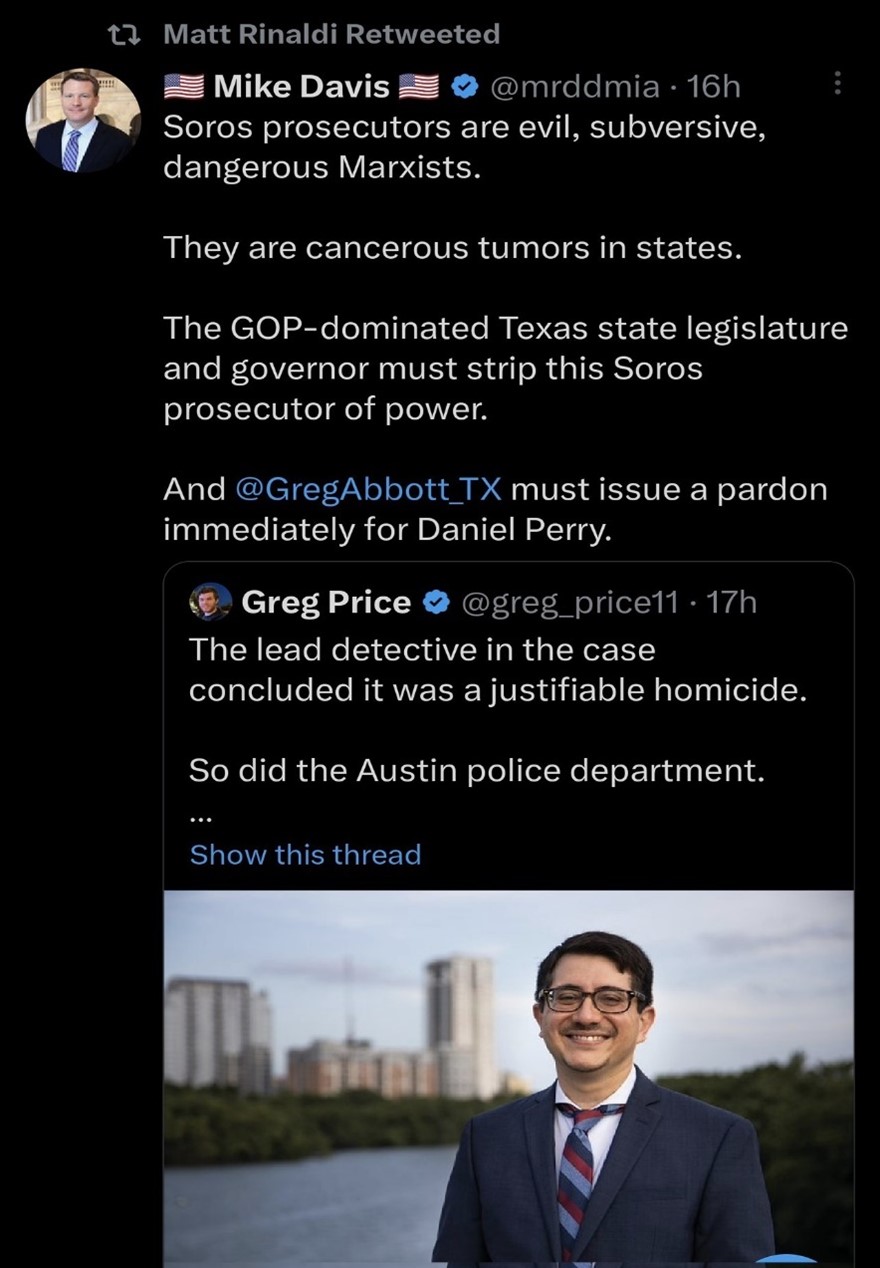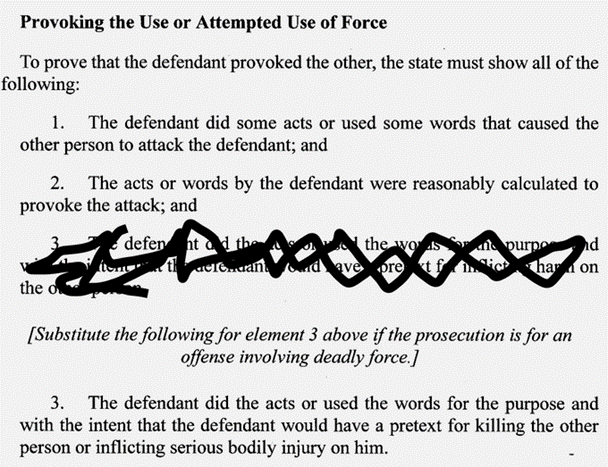Daniel Perry is not a victim
Andrew Fleischman works on behalf of the wrongfully or unfairly convicted at Sessions & Fleischman. He wrote a fantastic article about convicted murderer Daniel Perry.
“The conservative narrative around Daniel Perry coalesced pretty early. An “evil,” “Soros-backed” prosecutor in Austin, Texas had wrongfully convicted an Army Sergeant who had done nothing more than act in reasonable self-defense when a BLM protester pointed an AK-47 at him. He should be pardoned, they argue, as the victim of liberal prosecutorial overreach—especially because police officers did not initially think that he had committed a crime.
Here’s the guy who selected many of Trump’s judges explaining his point of view:
This story has such narrative force right now because it confirms an important prior on the Right: the law is unfairly applied to them, and they courts have conspired to persecute them while allowing a pervasive crime wave to destroy America’s cities.
But this account has two minor problems:
- The facts
- The law
The single most important fact that conservatives come back to, again and again, is that the victim, Garrett Foster, had pointed an AK-47 at Daniel Perry’s head. And it’s not true.
Let’s start with the obvious. There were many eyewitnesses in this case. And not one of them testified that Foster had pointed his weapon at Perry. “That’s nothing,” Perry stans rely, because these people are BLM protesters totally devoid of the simple decency and kindness that marks real Americans, and they must have all agreed to lie in court, identically, to ensure that Perry would be convicted by a panel of soft-handed Soros-loving libs.
But you know who else said the weapon was not pointed at Daniel Perry? Daniel Perry. See, Perry made the classic mistake of so many people who like police. He talked to police. And he told a sympathetic officer that “I believe[d] he was going to aim at me. I didn’t want to give him a chance to aim at me.” Not only did Foster not aim a weapon at Perry, he didn’t have the “chance” to.
And why, exactly, did this altercation happen in the first place?
As Perry told police, he was distracted because he was trying to “hang out” with an Uber passenger and she requested $200 for her time. He was so distracted that he ran his car into some protesters. Witnesses described the sound of squealing tires as he accelerated.
One of the people Perry almost hit was Whitney Mitchell, a quadruple amputee who was being pushed through the protest by a friend while her husband, Garrett Foster, marched. Foster, an Air Force veteran, was upset that someone had almost hurt or killed his wife. Protesters were banging on the car with their hands. And Foster told Perry to “move on,” gesturing at his weapon
Perry shot him five times in the center of mass, killing him. And then he called police, saying he’d fired in self-defense. The cops were sympathetic! After all, these were people who were protesting them, specifically, and the news were filled with stories of lawless protesters “burning cities to the ground” while the police were held back by liberal city officials. Perry was not even arrested, initially, and the detective he spoke to was called as a witness for the defense.
Perry did not testify at trial, and so the jury had to take the facts as they were given, and decide whether he was justified in shooting Foster. It did not help that Perry repeatedly posted on social media about killing protesters, that he claimed he would be acquitted on self-defense if he did so, and that, when a friend pointed out that you can’t shoot someone you provoke, he pushed back.
And provocation was at the heart of the State’s case. “The rule of law is that if the defendant provoked another to make an attack on him, so that the defendant would have a pretext for killing the other under the guise of self-defense, the defendant forfeits his right of self-defense” Elizondo v. State, 487 S.W.3d 185, 196 (Tex. Crim. App. 2016).
Mark Bennett, an astonishingly good Texas criminal defense lawyer did the yeoman’s work of actually posting the jury instructions:
So, even if Foster pointed a gun at Perry, Perry would not be justified in shooting him if his actions, like almost running over his wife, were reasonably calculated to provoke the attack, or if Perry came out there in the hopes of getting to kill someone that day. So when people point to Perry’s social media posts, that isn’t an irrelevant side show or an attempt to punish conservatives for their free speech—it is legally relevant to whether he had a right to self-defense. You can’t shoot the guy you’re mugging and claim self-defense. And you can’t, maybe deliberately, drive your car at a crowd of protesters and then immediately escalate when an armed person tells you to move on.
In other words, this is not some new-fangled rule meant to entrap law-abiding conservatives. It’s a long-standing rule without which the laws of justification would swallow laws against aggravated assault and murder. ‘It is founded upon the theory of estoppel and based upon the legal maxims that, ‘A man may not take advantage of his own wrong to gain favorable interpretation of the law; he seeks the law in vain who offends against it….[O]ne cannot willingly and knowingly bring upon himself the very necessity which he sets up for his own defense.’” Elizondo v. State, 487 S.W.3d 185, 198 (Tex. Crim. App. 2016).
This is not a legally complicated case. The jury could find that Perry was not justified if they believed that Perry provoked the fight to have the excuse to kill someone, or if they believed that the force was not “immediately necessary to protect Perry against Foster’s attempted use of unlawful deadly force” since Foster never actually pointed a weapon at Perry. If Perry argues on appeal that the evidence against him was insufficient, he will probably lose, because Texas courts routinely affirm convictions where there is much stronger evidence of self-defense.
For instance, Texas criminal appeals attorney Doug Gladden pointed to Braughton v. State. A dude, Dominguez, got into a drunken fight with his girlfriend in the middle of the day, as one does. The dude starts riding home on his motorcycle when he encounters the defendants father, and starts revving his engine and tailgating him for some road ragey reason. The father calls his son and says he’s scared. When they get to the front of the defendant’s home, the dude starts screaming and beating the father, even after the defendant says he has a gun. When the dude reaches for his satchel, the defendant shot him. This resulted in a conviction and a sentence of twenty years in jail, and the Court of Appeals said it was fine, over a dissent.
But nobody has talked about pardoning Braughton. Or any of the dozens of other much stronger self-defense cases that have been upheld on appeal. Instead, Texas conservatives have put their shoulder to the wheel for a man who seems to have accelerated his car towards a woman in a wheelchair hoping for the chance to kill someone, and when that woman’s husband told him to get back in his car and move on, murdered him in cold blood.
On these facts. Governor Greg Abbott has promised to issue a pardon.
Not only is this a not particularly sympathetic defendant, but the pardon sends a terrible message. Provoking a fight to kill someone is ok, the pardon will, say, if the right kind of person is killed. And other people who are unduly confident in their knowledge of Texas self-defense law will be tempted to test the limits of the governor’s mercy, to the detriment of the safety of the public.
To the extent that deterrence is a thing, Perry’s conviction serves as a valuable deterrent. It tells people that deadly force is to be used as a last resort, not a test of manhood. And that all lives, even liberal ones, matter in the State of Texas. This pardon would be a baffling exercise of executive discretion.
I sincerely hope that Abbot is simply full of shit. That he will let the appeals process play out, get the unanimous message from the board of pardons that this is not a good candidate for pardon, and accept the decision with some grumbling. Because the alternative is a world where some people’s murders count, and others don’t. Where some people have a right to open carry, and others don’t. That’s not liberty. It’s tyranny.
Let’s hope cooler heads prevail.


